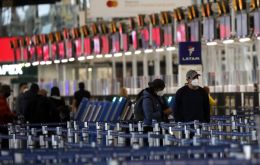MercoPress. South Atlantic News Agency
Tag: Tourism industry
-
Tuesday, December 29th 2020 - 09:38 UTC
Collapse of tourism industry because of Covid-19, has caused US$ 2 trillion loss to the global GDP

International arrivals fell by 72% over the first ten months of 2020, with restrictions on travel, low consumer confidence and a global struggle to contain the COVID-19 virus, all contributing to the worst year on record in the history of tourism.
-
Wednesday, November 18th 2020 - 08:57 UTC
Chile set to open borders 23 November but with Health Passport and health insurance

Chile is set to open its borders for the first time in eight months as it marks November 23 as its official tourism reopening date. The Ministry of Health announced last week that Chile would allow tourists to return to the country on November 23, but like other countries that are reopening, Chile is applying a measured approach to kick-starting tourism with new requirements in place for arrivals.
-
Friday, May 15th 2020 - 08:04 UTC
Massive €18 billion support for France's tourism sector, “rescuing it is a national priority”

France announced measures worth €18 billion (US$19 billion) to support its tourism sector, which has been hammered by the COVID-19 crisis and resulting shutdown in beaches, leisure attractions, and hotels.
-
Saturday, April 25th 2020 - 08:58 UTC
COVID-19 K.O. for travel and tourism industry: 100 million jobs on the line

The Travel & Tourism sector faces a staggering 100 million jobs losses due to the COVID-19 pandemic, according to the World Travel & Tourism Council, WTTC. The startling figure, based on research from WTTC, has increased by over 30% in the last four weeks, indicating the sheer crisis affecting the sector.
-
Monday, November 25th 2019 - 12:40 UTC
What is the Airbnb effect on the global tourism industry?

Every so often, industries become disrupted by an innovative idea or different approach to providing services in order to match customer demand. We have seen how Uber changed the landscape for the taxi industry, using a model that offers a quick and easy solution to booking a local taxi via an app and signing up self-employed drivers.
-
Friday, October 12th 2018 - 08:38 UTC
A no-deal Brexit a “disaster” for Spain's tourism industry

A no-deal Brexit would be “a disaster” for Spain, the country’s UK tourism chief has warned. Javier Pinanes, director of Spain’s tourist office in London, acknowledged that travel disruption caused by the UK and the European Union failing to negotiate an agreement would be “a really big problem”.
-
Thursday, October 11th 2018 - 08:54 UTC
International tourism industry remains robust with 6% increase in first six months of 2018

According to the World Tourism Organization (UNWTO)’s latest barometer, international tourist arrivals grew 6% in the first six months of 2018 after a record year of growth in 2017. All world regions enjoyed robust growth in tourist arrivals in January-June 2018. The increase was fueled by strong demand from major source markets, supported by an upswing in the global economy. It comes after record year-round growth of 7% in 2017.
-
Monday, May 5th 2014 - 06:42 UTC
Foreign tourists in Britain expected to spend 46 billion dollars by 2017

Spending by foreign tourists in Britain is set to rise 34% to over 27 billion pounds (46 billion dollars) a year by 2017, according to research published on Friday, boosting the country's retail and leisure industries.
-
Saturday, November 20th 2010 - 04:58 UTC
Tourism industry generates 9% of global GDP and 8% of world employment

The travel and tourism industry is one of the largest and most dynamic industries in today’s global economy expected to generate about 9% of total GDP and provide for more than 235 million jobs in 2010 representing 8% of global employment.
